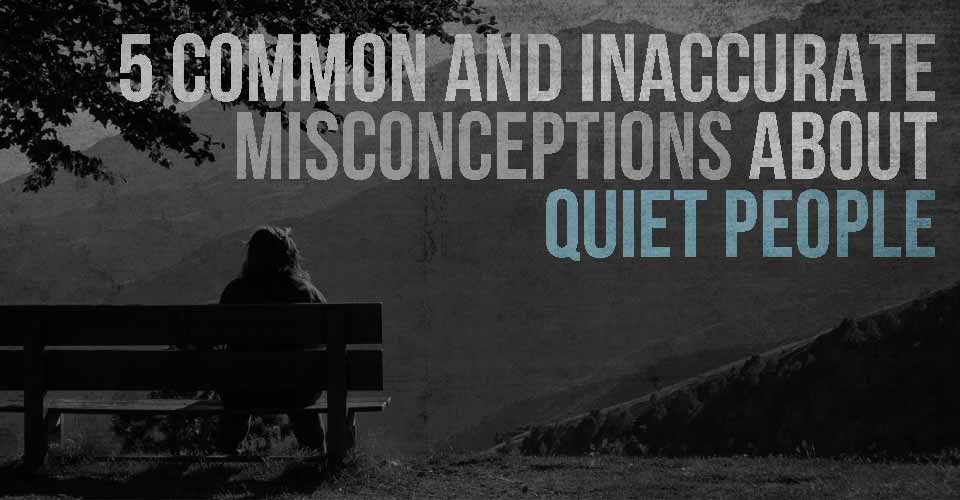There are a lot of folks out there who have strange ideas about quiet people.
One of the worst is how “all quiet people are the same.” There are countless reasons as to why someone might not talk to you- maybe they’re shy, maybe they simply don’t like you, or maybe they have a million things going through their mind and deciding on one thought to share is debilitating.
Those who don’t understand the various reasons why this happens usually decide to come up with their own absurd assumptions about what quiet people are up to.
On the other side of the spectrum, even quiet folks themselves delegate their personal traits to all other quiet people on this planet.
1. They Need Your Help
One of the most common misleading assumptions about quiet people is that they want to be talkative, but aren’t able to be. They lack self-esteem or confidence, or can’t find the right words, but maybe if you hold their hand you could guide them through the murky waters of communication and save them from their misery.
Actually, a lot of people are comfortable without speaking very much, and it has nothing to do with lack of confidence or poor social skills. Or they are comfortable until someone makes a point of mentioning how little they are saying and then tries to force them into a conversation, which is awkward at best.
What this assumption boils down to is projection. People who find talking to others as something that comes easily, usually would think something was wrong with themselves if they were quiet, so there must be something wrong with everyone else who is quiet as well. And because they would likely want someone to try and coerce them out of their dilemma of silence, they will try and “help” you the same way.
Before “helping” someone who isn’t saying as much as you think they should, maybe try to understand what the reason is for their lack of chattiness.
2. They Lack Social Skills
As someone who was once known as a “quiet person”, I can tell you that social skills do not play as massive a role as one might think. It is possible to be quiet and to lack social skills, but the two are not directly related. I have known plenty of talkative people who are just as socially inept as quiet people.
Obviously, there are exceptions, but for the most part, quiet people aren’t lacking social skills. They may be observing, they may be over-thinking, or hundreds of other things may be going on in their mind.
Don’t automatically assume that because someone isn’t talking, it’s because they don’t know how.
3. They Lack Confidence
Again, this assumption doesn’t solely fit into the characteristics of quiet people. Not all quiet people are shy nerds who can’t get over how much you may laugh at them when they speak, and not all of them undervalue themselves like you think they might.
Arrogance and over-confidence play a role in someone being silent just as equally as insecurity does. Some people might think they are smarter than others, or that the conversation going on is below them.
To assume that someone is quiet just because they don’t think highly of themselves is ridiculous. In fact, it’s possible they may think higher of themselves than they think of you.
4. They Want To Be Left Alone
When a quiet person is among a group of loud people, or extroverts, they can stick out like a sore thumb. And most people will think they want to be left alone. This isn’t entirely true, however.
Oftentimes, introverts are quiet but not for the reason you might think- it’s not because they desire solitude, but rather that they are deprived of energy. Being around large groups of people can drain an introvert to the point they won’t communicate as much as you would like them to. However, when an introvert is in a small group of their friends, they are anything but quiet. So, it’s not that they want to be left alone, they just prefer to spend their energy on other things.
5. They Are Mad At You
When people see each other in passing, there is usually some sort of interaction that says “everything is fine, we’re good.” Whether it be a friendly “hello”, or a “how’s it going”, there is usually some sort of interaction. Let’s call it a “baseline” interaction.
This baseline is different for those who are quiet versus those who are openly talkative. Someone who is more talkative will feel it is necessary to give a vocal reaction to seeing another person, whereas a quiet person will come from a purely logical point of view- meaning if everything is okay, and nothing has changed between today and yesterday, the normal reaction would be to do nothing. And that can seem like they are upset or mad with you, but again this hits on projection. Just because someone reacts in a different way than you would, doesn’t mean anything is wrong with them.
Basically, try not to judge those who are quieter than you, and don’t project what you would do into situations where, clearly, those other people are not you.
Everyone handles situations differently and we are all unique beings just trying to get along on this planet.
By Raven Fon



